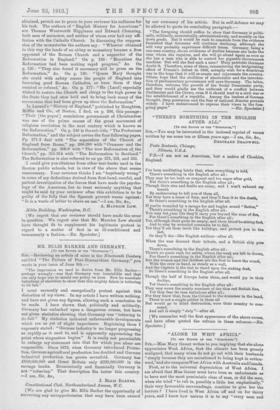MR. ELLIS BARKER, AND GERMANY.
ITO Till EDITOR 01 Till " SPECTATOR.",) Stn.,—Reviewing an article of mine in the Nineteenth Century entitled "The Failure of Post-Bismarckian Germany," you wrote in your issue of June 8th :— " The impression we used to derive from Mr. Ellis Barker— perhaps wrongly—was that Germany was irresistible and that our only hope was to mould our policy on hors. Now he marshals battalions of statistics to show that this mighty fabric is tottering to its fall."
I must earnestly and energetically protest against this distortion of my views. In my article I have written nothing, and have not given any figures, allowing such a conclusion to be made. I have shown that, politically and militarily, Germany has embarked upon a dangerous course, but have not given statistics showing that Germany was "tottering to its fall." My statistics indicated unfavourable developments
which are as yet of slight importance. Explaining them I expressly stated: " German industry is no longer progressing as rapidly as it used to, and is apparently approaching the point where stagnation begins." It is really not permissible to enlarge my statement into that for which you alone are responsible. Since 1879, when Germany introduced Protec- tion, German agricultural production has doubled and German industrial production has grown sevenfold. Germany has £950,000,000 and Great Britain only £230,000,000 in the savings banks. Economically and financially Germany is not " tottering." That description fits better this country.
am, Sir, Sto., J. ELLIS BARKER.
Constitutional Club, Northumberland Avenue, W.C.
[We are glad to give Mr. Ellis Barker the opportunity of correcting any misapprehension that may have been caused by our summary of his article. But in self-defence we may be allowed to quote its concluding paragraph:—
"The foregoing should suffice to show that Germany is politi- cally, militarily, economically, administratively, and morally on the down grade. But it would be rash to conclude from the evidence furnished that Germany will continue declining, although she will very probably experience difficult times. Germany, being a one-man country, shows evidences of decline because she lacks the man whom she requires, and she will go ahead again as soon as she has a man who is able to control her gigantic Government machine. But will she find such a man P Many patriotic Germans doubt it. Therefore, some of them, remembering the invigorating effect of Prussia's defeat in 1808, actually wish for a disastrous war in the hope that it will re-create and rejuvenate the country. Others hope that the abolition of absolutistic and the introduc- tion of parliamentary government will save Germany. The latter, therefore, welcome the growth of the Social Democratic party, and they would gladly see the outbreak of a conflict between Parliament and the Crown, even if it should lead to a civil war or the establishment of a republic. Among the leaders of Gorman thought, deep pessimism and the fear of national disaster prevails widely. I have endeavoured to express their views in the fore- going pages." —ED. Spectator.]










































 Previous page
Previous page